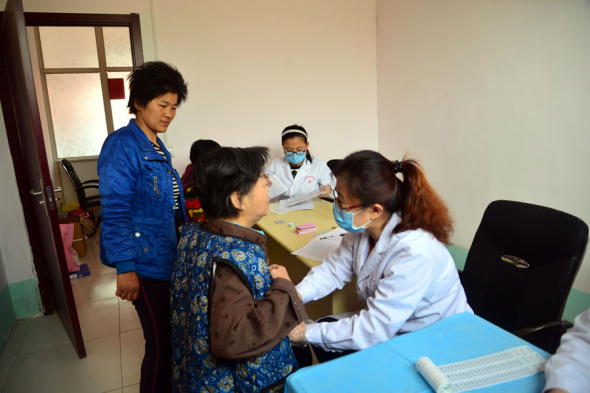
Villagers undergo checks for cervical and breast cancer at the family planning office in Liaocheng city, Shandong province. (ZHAO YUGUO/FOR CHINA DAILY)
Complicated procedures
In 2012, when his wife gave birth to their first child, Zhao Ping, a Dongfeng native who owns a grocery store in Guiyang, had to return to the township to complete the birth registration forms.
"The procedures were very complicated back then, and we had to collect or fill in a lot of forms, including our marriage certificate, a letter from the local hospital confirming that my wife was pregnant and a letter from the local authorities certifying that my wife and I did not already have a child," he said.
He was pleased that the procedures were simplified in 2016 because he will not have to travel to Dongfeng to register if he and his wife have another child.
Instead, he will only need to enter their personal information, such as names, ID numbers and place of household registration, on the local government's website.
The change implemented by the family planning services in Guizhou is a microcosm of the transformation that has happened nationally, which is estimated to have affected nearly 1 million family planning officials, according to a national survey in 2015.
The number of family planning officers has remained unchanged since then, despite the relaxation of the family planning policy, according to the commission, which said the officials have been integrated with health workers at the grassroots across the country.
For example, family planning officials in Gansu province are also actively engaged in the provision of services such as health education, disease control and prevention, and poverty alleviation.
Meanwhile, many provinces have streamlined their administrative procedures so people can receive a wide range of services, including birth registration, maternal and child healthcare and child vaccinations, by producing a single certificate instead of the large number of documents required before.
Yuan Xin, a professor of population studies in Nankai University in Tianjin, said family planning officers will now be expected to focus more on providing healthcare services, but the authorities will need to provide training during the transition period.
"The family planning workers are familiar with reproductive health, but most lack sufficient knowledge of overall healthcare, including amended or new policies and technologies," he said.
"A number of training programs must be arranged to allow the workers to provide a more diverse range of healthcare."


















































